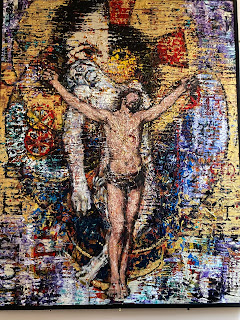Why is the Church Talking About Race?
“So God created humankind in his image, in the image of God he created them; male and female he created them.” (Genesis 1:27, NRSV)
“Is not this the fast that I choose: to loose the bonds of injustice, to undo the thongs of the yoke, to let the oppressed go free, and to break every yoke?” (Isaiah 58:6 NRSV)
Recently I was asked why the Church is talking so much about racism lately. Shouldn’t the church be talking about more spiritual things, focusing more on discipleship? Doesn’t anti-racism belong more to the political sphere?
There is a simple answer to such questions. The Church is talking so much about racism because it would be unfaithful not to.
Let me explain. The work of anti-racism is not primarily political. It is theological, spiritual. As the Genesis passage above reminds, people…all people…are made by God, in the image of God. There are no exceptions. Thus, anytime someone is treated as less than that, particularly in when such treatment is systemic, the Church must stand up and do what it can to heal the brokenness and restore people to their God-given identity. In this way, anti-racism work is “God-honoring” work. It is discipleship.
The Bible is very clear that standing up for the marginalized and oppressed, practicing justice, is an important part of faithful living. Both the Old and New Testaments contain instructions for God’s people to work for a more just world. The above passage from the prophet Isaiah makes clear that God does not want our religious piety if we are not willing to heal injustices towards the marginalized and oppressed. In the Gospel of Luke, Jesus clearly states that his mission is related to social justice: “The Spirit of the Lord is upon me, because he has anointed me to bring good news to the poor. He has sent me to proclaim release to the captives and recovery of sight to the blind, to let the oppressed go free, to proclaim the year of the Lord’s favor.” (Luke 4:18-19) He is actually quoting from the prophet Isaiah here. These are just a few of many passages calling God’s people to the work of social justice and standing against oppression.
Further, we United Methodists have a foundation of advocacy related to race. John Wesley and the early Methodists were outspoken critics of the slave trade in both England and America. In the name of God, they called for a swift end to the slave trade and the institution of slavery, itself. John Wesley’s last letter was sent in 1791 to William Wilberforce, a British member of Parliament working tirelessly to end the slave trade, urging him to keep the work going for the sake of God, reminding Wilberforce that God was with him and had indeed called him and equipped him for such a bold stance.
For too long, the Church has been silent in the face of racism, preferring the peace of neutrality to the hard, uncomfortable, and often unpopular work of anti-racism. It has done so by relegating anti-racism to the realm of politics. For too long, the Church, through silence, has maintained the privilege of some at the expense of others. Yet, the Church will always speak to such matters, even when it says nothing. For silence itself is a statement, and not a faithful one.
I am proud to be a part of a United Methodist Church that continues that Biblical and Wesleyan tradition of standing with the oppressed and marginalized by engaging in the work of anti-racism. Here at Christ Church United Methodist, we have an Anti-Racism Task Force whose aim is to become informed on issues and matters related to race, build beloved community, and stand ready to respond to racial injustice in our community and the world. I am also proud that Christ Church United Methodist is part of the Florida Annual Conference of the United Methodist Church, which, under the leadership of Bishop Kenneth Carter, has named Anti-Racism as Discipleship as a major initiative of Florida United Methodist Churches.
In the end, anti-racism work is spiritual work with political implications. When we are faithful to it, we become part of God’s healing and restoration for the world. It is hard work that requires brutal honesty, a willingness to acknowledge and cede privilege, and a dedication to the theological premise that all people are made in God’s image. Still, in this dedication we find the joy and beauty that God intended for creation.
And that is why the Church is talking about race today.


Comments
Post a Comment